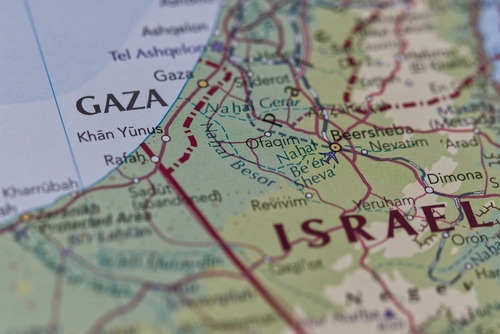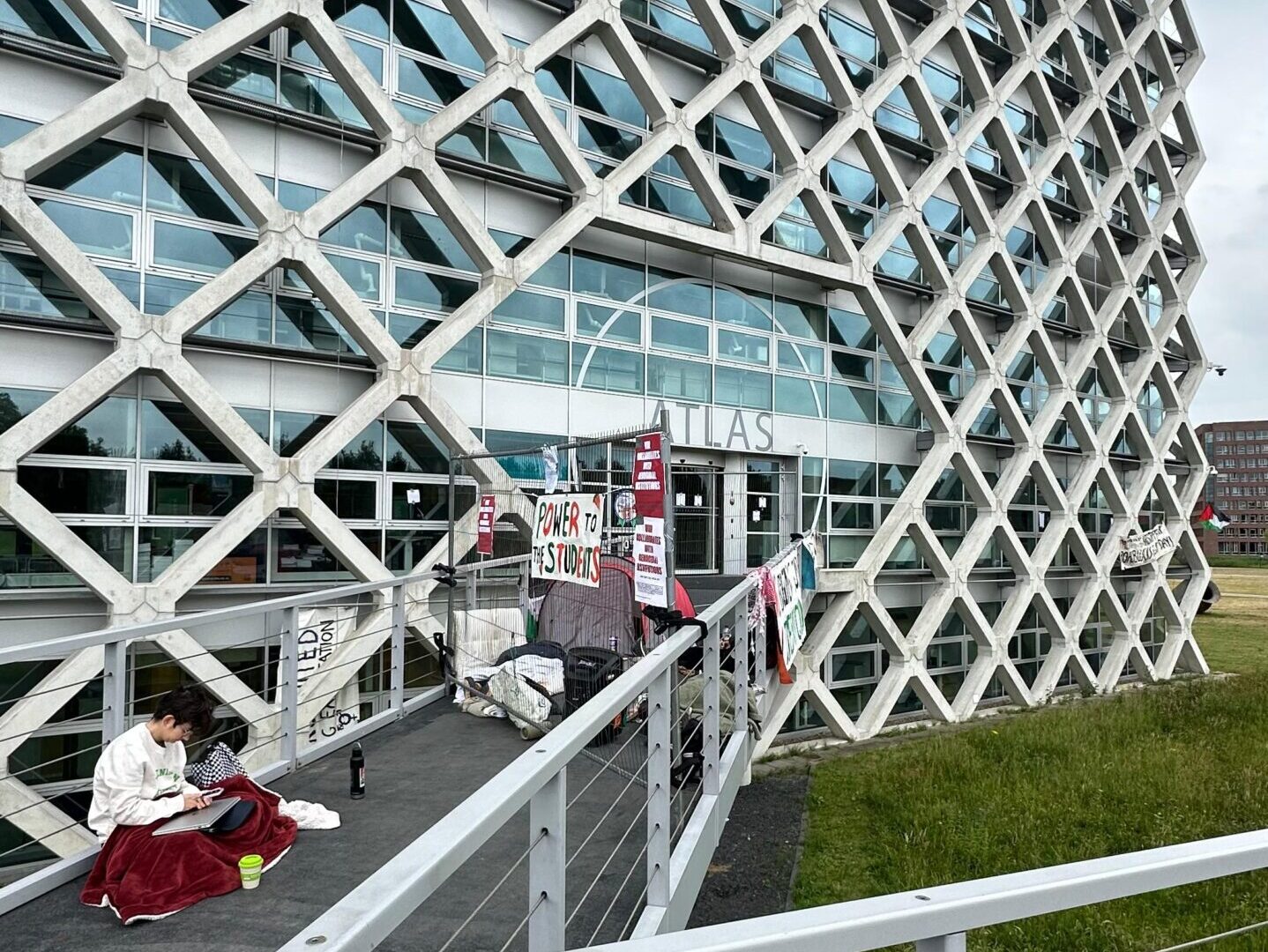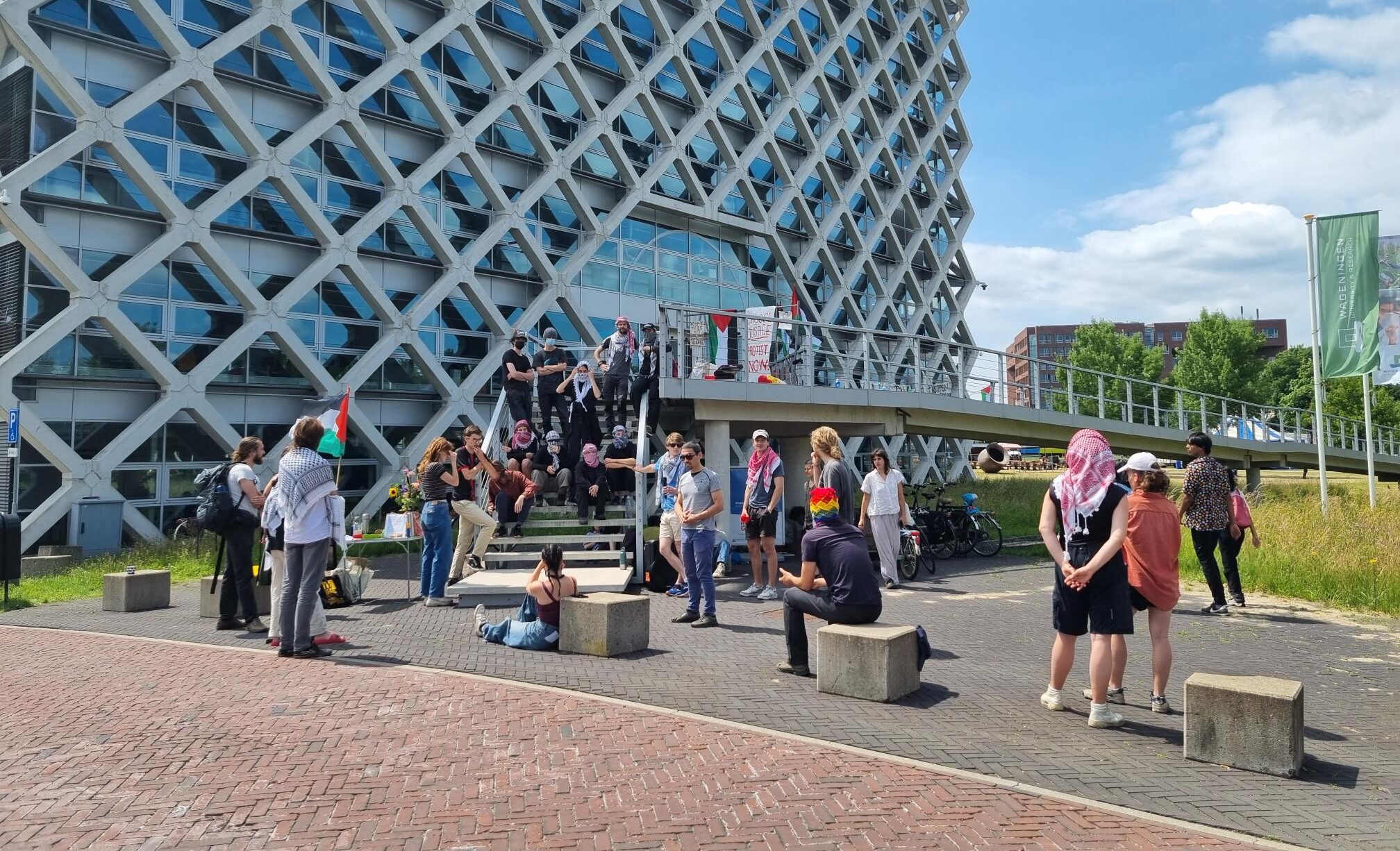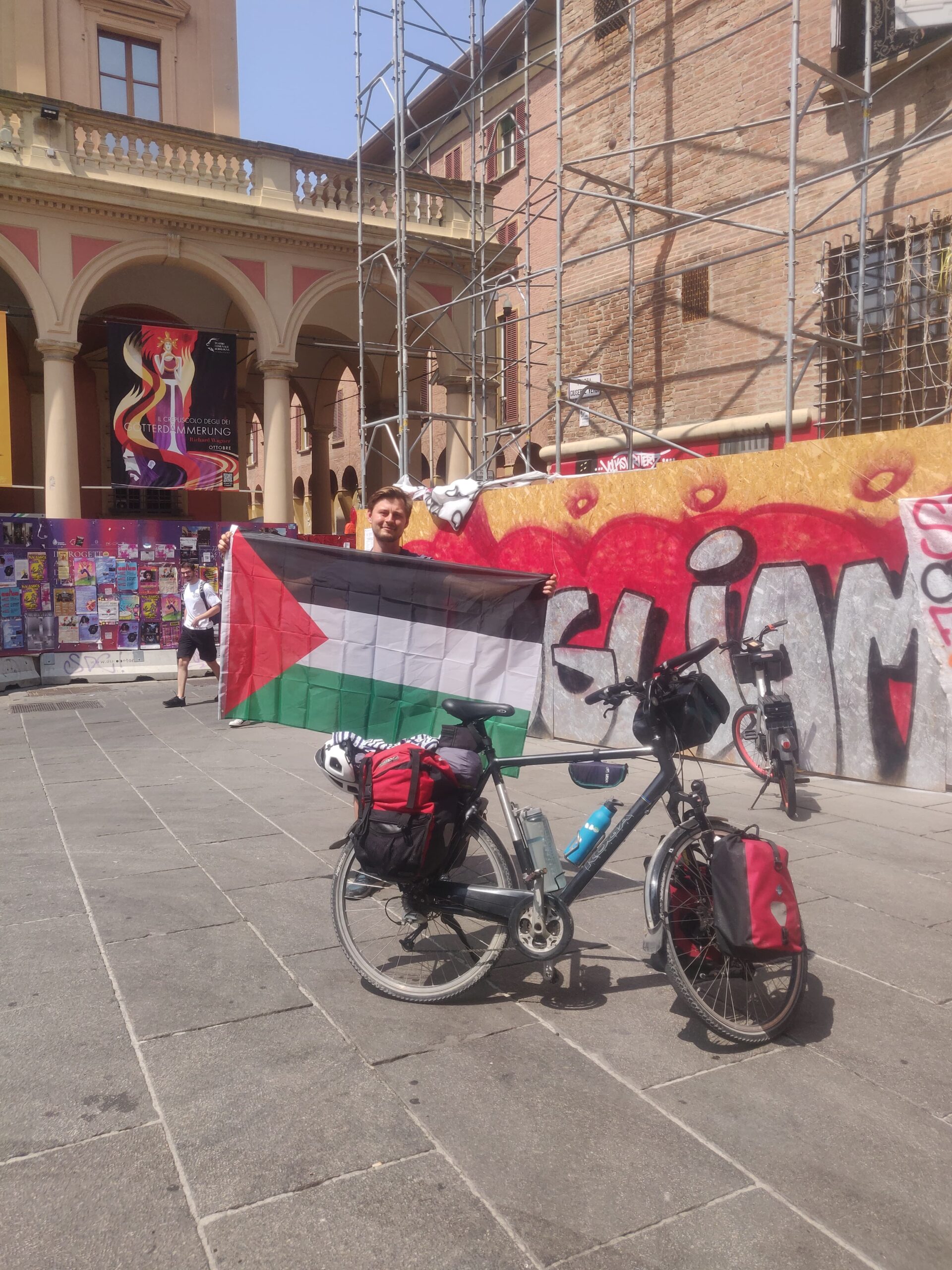Vandaag (en afgelopen donderdag) blokkeren pro-Palestina-activisten beide ingangen van het Atlas-gebouw, waar het college van bestuur werkt. Hun boodschap: WUR moet de banden met Israël verbreken. Hun frustratie is begrijpelijk, maar ook deze vraag is aan de orde: brengt het blokkeren van de toegang en het weigeren van dialoog ons dichter bij ‘vrede’ of drijft het ons verder in verdeeldheid?
Wat levert het verbreken van de banden met Israël op? Het is niet constructief om instellingen die geen invloed hebben op politieke beslissingen van ons te vervreemden, zeker niet wanneer deze instellingen academische en humanitaire waarde hebben voor WUR. In het belang van onze universiteit moeten we ons afvragen of dergelijke acties een betekenisvolle impact hebben of alleen maar onze eigen mogelijkheden voor studie en samenwerking beperken.
Het Israëlisch-Palestijnse conflict wordt vaak vereenvoudigd tot een verhaal van Palestijns slachtofferschap versus Israëlische wreedheid. De werkelijkheid is echter complexer. Gaza wordt bestuurd door Hamas, een als terroristische organisatie aangemerkte groepering die met steun van het volk de macht heeft gegrepen en sindsdien geweld en ellende in de regio heeft gezaaid. Dat is ook een deel van de werkelijkheid, maar daar wordt vaak over gezwegen.
Symbolische acties zoals hongerstakingen of blokkades trekken de aandacht. Maar aandacht alleen leidt niet tot verandering. Dialoog wel. Luisteren wel. Proberen te begrijpen, zelfs als dat moeilijk is, wel.
Op een universiteit moeten we worden uitgedaagd, niet alleen door anderen, maar ook door ideeën die ons ongemakkelijk doen voelen. Dat geldt ook voor de media, en dat geldt ook voor onszelf.
Als we rechtvaardigheid belangrijk vinden, moeten we ophouden ons af te sluiten voor complexiteit. Ik dring er bij Resource en alle andere media op aan te streven naar evenwichtige journalistiek die meerdere kanten van het verhaal belicht. En tegen mijn medestudenten zeg ik: blijf nieuwsgierig. Stel vragen bij de krantenkoppen. Zoek naar nuances. Want als slechts één kant wordt verteld, gaat de waarheid verloren, en daarmee ook ons vermogen om samen vooruit te komen.
Meital Cohn, masterstudent Resilient Farming and Food Systems

 Foto Shutterstock
Foto Shutterstock 


כתבה מפוספסת. הכותבת מתלוננת על חוסר איזון, אבל כשניתנת לה במה, היא בעיקר עסוקה בלהתלונן למה הצד השני לא בסדר. הכותבת קוראת לדיאלוג, אבל ניכר שהיא לא עשתה מאמץ להקשיב לעמדה שמנוגדת לשלה.
מה קורה פה לדעתי? רוב היהודים בישראל מחזיקים בתפיסת עולם שיוצאת מנקודת מוצא שכמעט לא מעורערת בישראל. אנחנו מגיעים למקום חדש, ומגלים שהנקודת מוצא הזאת, פתאום היא לא קונצנזוס מוחלט, אלא נקודה שדי קשה להצדיק. וזה די מבלבל ודי מערער. אם לסכם את הנקודה הזאת בשתי מילים: עליונות יהודית.
אנשים שאולי לא כל כך מעורים בסכסוך הישראלי-פלסטיני, רואים מעל 50,000 הרוגים בעזה, מתוכם כ-15,000 ילדים, רואים מצור ורעב, רואים הרס של כל האוניברסיטאות ושל רוב בתי החולים, רואים 95% מהאדמות החקלאיות הרוסות. הם אומרים, בלי צורך להבין יותר מדי, שזה חייב להפסיק.
ומה אומר הישראלי הממוצע: זה מורכב. יש חמאס, יש 7.10, זה מאוד מורכב. אבל למי שחושב שחיים של פלסטיני שווים לחיים של ישראלי, ברור שהרג של 1000 אנשים ב-7.10 לא מצדיק הרג של 50,000 אנשים מאז. ואף מורכבות לא יכולה להצדיק את זה
In English: this piece is a bit of a missed opportunity. The writer complains of imbalanced reporting, but when she is given a platform, she mostly spends it saying what others are doing wrong. She calls for dialogue, but it is obvious she didn’t take the time to listen to viewpoints that are different from her own.
I think what’s happening here is that most Jewish Israelis are immersed in a worldview that is never challenged. When they are outside Israel, they suddenly realize that their viewpoint is not a complete consensus, but actually pretty difficult to justify. And that is uncomfortable and confusing. If I can summarize this viewpoint in two words: Jewish supremacy.
Others who may not be familiar with the intricacies of the Israeli-Palestinian conflict, see more than 50,000 people killed in Gaza, of which 15,000 children. They see a blockade and imposed famine, they see all universities and most hospitals destroyed, they see 95% of agricultural land destroyed. They see, without needing to understand too much, that this must be stopped.
To this, the average Israeli says: it’s complex. There’s Hamas, there’s 7.10, that’s very complex. But if you view Palestinian lives as equal to Israeli lives, obviously the killing of 1000 people doesn’t justify the killing of 50,000. No complexity can justify that.
Case in point, David. Nuance matters. Meital hasn’t tried to justify a single death.
She is asking if blocking Atlas in an effort to block Israeli academics from interacting with our university is really going to prevent any more tragedy. And she is also asking for balanced journalism on this topic. That’s a reasonable request when some voices are so much louder than others. But, somehow, you say that these questions she asked make her a Jewish supremacist? It’s dangerous to other each other like that.
I also wonder how alienating Israeli academics, even those who are vehemently opposed their government and its violence against Palestinians, who associate with WUR because they want to study nature, will lead to peace for Palestinians. And before you baselessly accuse me, too, I have had plenty of dialogues about this and attended seminars from people with opposing viewpoints. Nonetheless, I am still not convinced cutting academic ties is the right path.
I can simultaneously hold that thought and also the thought that the suffering and death needs to stop immediately. It’s a good thing that we are all allowed to have and share different and complex opinions, some of us in shades of grey and others maybe more black and white, and it’s not a reason to belittle and dehumanize each other.
But sure, let’s fight against the existence of nuance so that we can keep fighting with each other.
I’m sorry, but I find the cognitive dissonance in the original article astounding. What nuance are we meant to find in the systematic destruction of the Palestinian population? Where is their justice? (https://decorrespondent.nl/16187/de-slotfase-van-de-genocide-is-begonnen-zo-drijft-israel-de-palestijnen-naar-een-concentratiekamp/df587b2a-c579-06d7-0e15-ba432b320e84). What is the dialogue we are meant to be having, and with who? The Israeli government sure does not seem interested in any dialogue. The Hebrew University of Jerusalem does not seem interested in any dialogue about their occupation of Palestinian land. What dialogue is available to the hundreds of Palestinians slaughtered by Israeli bullets as they wait for food aid? Or the Palestinian families who are violently dispossessed of their generational home in the West Bank to make way for Israeli settlers?
And the call for balanced journalism? It is the perspective of Israel that dominates western media. It is Palestinian voices that have been systematically silenced and marginalised for decades.
We need to call a spade a spade. Israel is engaged in the systematic destruction of Palestinian life in Gaza and the West Bank, and many Israeli universities are complicit in this. If we give any semblance of truth to international law and global human rights, we must resist this destruction by all (non-violent) means available to us, including boycotting Israeli institutions complicit in human rights violations. A increasing majority of Dutch universities now realise this and are taking action – why isn’t WUR?
The point of the academic boycott was never to alienate individuals, but to signal that the conduct of Israeli universities is in violation of ethical codes of conduct, such as WUR’s Principles of Collaborations. These institutions have been actively involved in war efforts and have marginalised critical scholars, among other things – see a recent report on the topic https://academictiesisrael.nl/
These matters are indeed complex and deserve proper investigation. For this reason, all Dutch universities have launched an assessment of the ethical aspect of their collaborations with Israel, which they then followed by different types of actions. (see https://www.erasmusmagazine.nl/en/2025/06/10/universities-more-under-pressure-over-their-statements-about-collaborations-with-israel/ – Eindhoven and Groningen have changed their positions recently).
To my knowledge, WUR is the only Dutch university who has refused to even investigate this question, instead principally refusing the idea of institutional responsibility with vague statements about ‘academic freedom’ – when, mind you, the academics supposedly enjoying this freedom could face persecution if they refuse to engage in particular collaborations.
Many students and staff have been trying to initiate a more thorough assessment through different means, such as petitions, meetings and discussion sessions. However, the Executive Board has never engaged with any of the arguments presented. In the end, ‘dialogue’ is not a virtue in itself, it’s a process through which arguments should be clarified and assessed in order to inform appropriate actions. Indeed, dialogue can create change, if it’s not conceived as an empty rhetorical exercise blocked by those in power.
Within WUR in general (and also in this original post and Liana’s reaction), there seem to be two points that seem be continuously being misrepresented within our university.
1. No one is asking for an academic boycot of individual academics. It is about institutional collaborations with HUJI for example, and the numerous other projects with institutional partners – see here for an overview https://academiccomplicity.nl . Many of WUR institutional partners are directly linked to the IDF or private compagnies such as Elbit, and ICL – that are all complicit in the genocide in Gaza, and the illegal occupation of the Westbank.
2. Whilst most of these project appear to be “political neutral” And as framed by Liana – at Wageningen we study “nature” – so how would cutting ties contribute to Peace? Nature is in Palestine-Israel waeponzied against Palestinian lives. Read the work of Irus Braverman, “settling nature” to understand that our collaborations with conservation actors in Palestine-Israel are deeply entrenched with settler colonialism.
Yes, we can have dialogue about if, and how to cut ties. And please do not suggest that people in favour of cutting ties are thinking in black and white – this position is grounded in extensive research/ expertise/ and contemplation. But what we can not continue to “dialogue” about – is that there is a genocide taking place (and not just a “complex conflict”). And the genocide needs to be stopped. And genocides in the past and presents, never have been stopped by silence. so maybe yes, speaking out, it the least we can do.
As the Black action group of more than 1300 Israeli academics bravely write;
“As academics, we recognize our own role in these crimes. It is human societies, not just governments, that commit crimes against humanity. Some do so by means of direct violence. Others do so by sanctioning the crimes and justifying them, before and after the fact, and by keeping quiet and silencing voices in the halls of learning. It is this bond of silence that allows clearly evident crimes to continue unabated without penetrating the barriers of recognition.”
https://www.bricup.org.uk/news-2/some-israeli-academics-appeal-to-university-heads-to-join-in-opposing-assault-on-gaza/
Oproepen tot nuance, saamhorigheid, de “waarheid” en begrip voor de complexiteit van het conflict, om vervolgens wel even eenzijdige redenaties en de drogreden “Palestijnen slecht, want Hamas” erin te fietsen, laten wel meteen zien wat de echte intenties van de schrijfster van deze brief zijn…